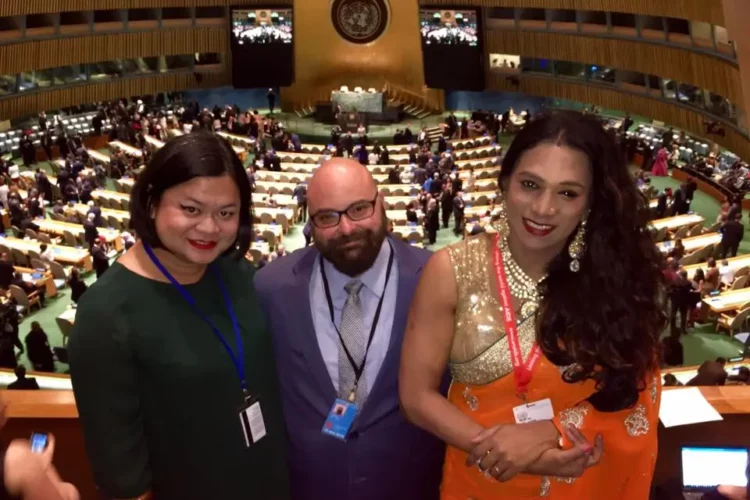NEW YORK, 9 June 2016 – United Nations delegates and civil society representatives from around the world convened in New York this week for the 2016 United National High-Level Meeting to End AIDS. The central focus of the High-Level Meeting has been the adoption of a universal political declaration focused on ending the HIV/AIDS epidemic by 2020. Unfortunately, political posturing by several UN members severely weakened the 2016 Political Declaration on Ending AIDS by allowing States to define their own “key populations” for HIV funding instead of relying on evidence, while failing to adequately address human rights abuses against those most impacted by the epidemic –– including transgender people, sex workers, gay and bisexual men, drug users, migrants and prisoners.
Allowing individual countries to self-select their own key populations – especially those countries that currently criminalize or refuse to acknowledge LGBT people – puts transgender people further at risk for HIV and limits prevention and treatment options for our community.
Global Action for Trans* Equality is all-too aware of anti-trans bias in the global HIV response. GATE’s original application to attend the High-Level Meeting was denied at the insistence of a small group of UN member States that blocked the accreditation of 22 civil society organizations – most of which represented LGBT or transgender-specific populations. Fortunately GATE co-director Masen Davis was invited to participate as an official member of the U.S. Delegation and GATE board member Abhina Aher served as a member of the civil society taskforce representing the India HIV/AIDS Alliance. Despite our best efforts, though, the socially conservative member states were effective in marginalizing transgender voices at the HLM. Even with the participation of GATE and other transgender activists from countries such as Kenya and Thailand, not a single transgender person was invited to speak in the official plenaries and panels.
The Political Declaration, adopted by the UN General Assembly on 8 June 2016, is to be commended for including the word ‘transgender’ in the introduction, acknowledging in Paragraph 42 the high rate of HIV among transgender women; however, this reference to HIV vulnerability is meaningless at best, and harmful at worst, without any actual strategies and commitments to increase HIV funding and services for transgender people in the rest of the Declaration.
Transgender people across the globe face significant human rights violations. Stigma, discrimination and violence against us contribute to extremely high rates of poverty, under- and unemployment, criminalization and incarceration, and HIV rates. Transgender women have HIV rates up to 49 times higher than non-transgender adults. Transgender activists are mobilizing worldwide to address these challenges. Our communities require targeted interventions and adequate resources to achieve the U.N.’s Sustainable Development Goals and end the HIV epidemic. The issues impacting transgender people are cross-cutting; we will not end HIV by 2020 – or 2030 – without changing the factors that contribute to HIV rates in our community, including stigma, discrimination, violence, criminalization, pathologization, and lack to access to legal recognition and transitional healthcare; without providing adequate political and financial support to trans organizations and networks; and without meaningfully including activists in all decision-making processes affecting us.
For more information on key populations’ response to the 2016 Political Declaration on Ending AIDS, see the Civil Society and Communities Declaration to End HIV.





